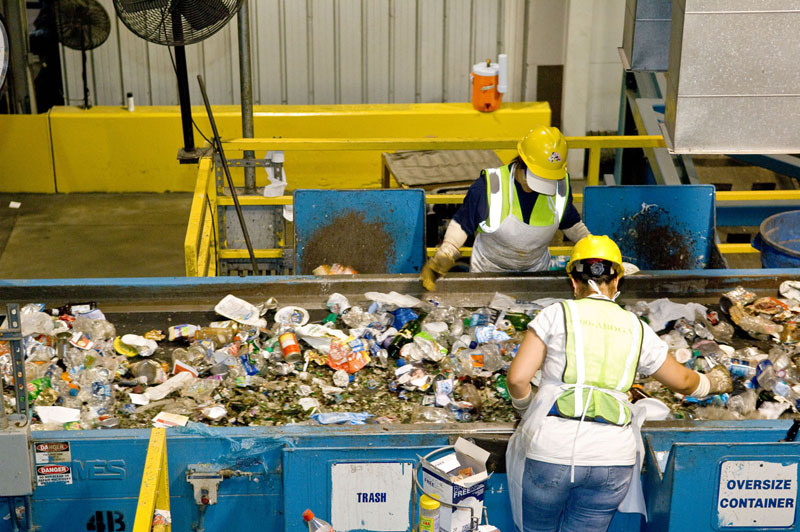80% of the shit you put in your recycling bin goes straight into a landfill. plastic recycling was a giant greenwashing scam by the oil industry
Quite honestly, going to a landfill seems so so so much better than the alternative: going into the environment and oceans, turning into microplastics and getting into food chains.
At least landfills are contained. Bury the shit until we have the tech to deal with it.
Some day, between the plastics, nutrients from organics, e-waste, landfills are going to be a goldmine.
Quite honestly, going to a landfill seems so so so much better than the alternative: going into the environment and oceans, turning into microplastics and getting into food chains.
Eh, it pretty much does all that bad stuff from the landfills
How does buried plastic cause microplastics to leech everywhere?
Weathering (sun, exposure, abrasion caused by plastic being moved by wind and sea) is a significant part of microplastic formation.
Here you go:
https://www.sciencedirect.com/science/article/abs/pii/S2468584422001088
You may have a misinformed concept of what landfills are; most garbage is not buried and covered, it is mostly exposed in open pits and just plain old mountains of garbage everywhere. However, even buried, it still decomposes into microplastics as explained in the paper linked
I read the snippets and abstract. I’m not seeing how these micro plastics are getting out of the landfills.
Environmental risks of microplastics in landfills
In landfills, microplastics are not standalone pollutants. Generally, such tiny particles can adsorb various harmful chemicals due to its large specific surface area [54].
Never knew that!
In this case, microplastics generally served as the vector for migrating adsorbed pollutants including heavy metals, antibiotics and other pharmaceutical and personal care products [55].
That’s scary, microplastics can absorb and spread pollutants!
But I’m not seeing anything about how they’re getting out from a landfill. I even read a few of the referenced articles. But nothing about if or how they’re getting out.
Landfills leak all the time. There is no actually contain all the toxic pollutants in there, specially not the microscopic stuff
https://www.colorado.edu/ecenter/2021/04/15/hidden-damage-landfills
Fair enough, there’s potential for landfills to leak.
But if its between that, dumping it in the ocean, or exporting it, the landfill wins.
I find it strange that more people haven’t put it together yet. The stuff plastics are made of is literally toxic byproduct from the O&G industry. Yes some of the products have extremely functional uses, but for the rest of it, they’re literally selling us their toxic waste and trying to make us responsible for disposing of it.
They might as well be standing outside the grocery stores with a barrel of goo and offering you a portion of it (for a price of course!) on your way out. So then you take it home and try to figure out what to do with it, and feel bad when you realize there is no way to dispose of it in an ethical way which is why they’re shoving the responsibility onto you.
Yes some of the products have extremely functional uses, but for the rest of it
Don’t you think most plastic products are used because it’s convenient?
I fight against it, but it is hard to not recognize how a plastic bottle is much lighter than any other bottle material, how convenient it is to get a plastic bag at the shop when you forgot yours, how convenient it is to get a ready meal in a cheap plastic box instead of an expensive and/or heavy washable container that you may have to bring back etc. Even compared to paper bags, plastic bags are more resistant, lighter and more compact.
There are probably much more similar convenience uses in the industry.
Plastic is mostly used because it’s convenient, not because of a big plastic conspiracy.So to solve the issue, we need states to make it expensive enough that people will overcome the inconvenience. Making people pay for plastic bags at shops works very well, for example.
I speak as someone horrified by the over-abundance of plastics in Japan. Some fruits have 3 layers of plastic around, even bananas come in plastic bags, because modern Japan is all about looking clean and being convenient, zero fucks given to ecology.
O&G?
Oil and Gas?
Oh wow duh, thanks lol
I read somewhere that because recycling plastic isn’t profitable, under the capitalist system there’s no incentive to do so.
Most plastics due for recycling just gets shipped off to poor countries for “reclycing” but isn’t at all, and a lot of it just ends up in the ocean.
So you’re better off just throwing plastics in the garbage where it will at least end up in landfill and not in the ocean.
That’s a bit cynical take. In many countries, including mine, there are dedicate bins for plastic waste which is the majority of waste from your typical household. It’s all being recycled into new products, not being shipped anywhere. Also, when it comes to plastic bottles for example, close to 100% of them are returned and recycled into new bottles. I’ve got a tiny-ass bin for the stuff that ends up in landfill because I separate and recycle it all as does most other people.
EDIT: Nevermind then. It’s all apparently dumped into the ocean. Sorry about the attempt in some positivity.
Germany has the highest recycling rate for plastics with 65 %. Not everything you put in the recycling bin is being recycled.
Recycling was the last in the list of what to do.
The problem is we forgot about Reduce and Reuse… The two most important things.
We use way too much instead.




